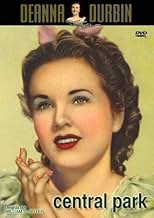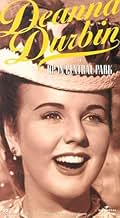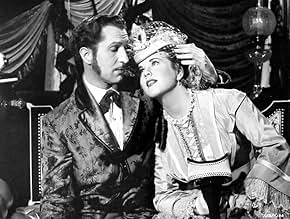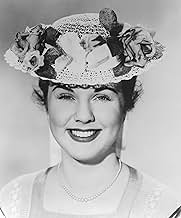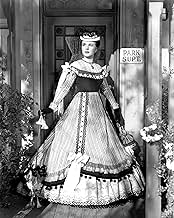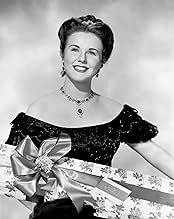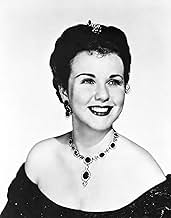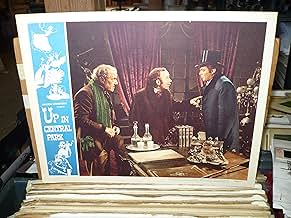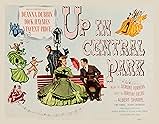A newspaper reporter and the daughter of an immigrant maintenance man help expose political corruption in New York City.A newspaper reporter and the daughter of an immigrant maintenance man help expose political corruption in New York City.A newspaper reporter and the daughter of an immigrant maintenance man help expose political corruption in New York City.
Nellie Fisher
- Dancer
- (as Nelle Fisher)
Boyd Ackerman
- Policeman
- (uncredited)
Patricia Alphin
- Guest
- (uncredited)
Alice Backes
- Swedish Immigrant Girl
- (uncredited)
G. Pat Collins
- Ward Heeler
- (uncredited)
Featured reviews
Not a bad film, in fact quite good, just a little underwhelming at the same time. It has a lot of things to like, there are a lot of omissions(We'll be close as Pages in a Book- though it's used as a cue at the end- and Fireman's Bride being the glaring omissions) but the music is still absolutely beautiful, the sprightly Oh Say, Can You See standing out. Pace, Pace Mio Dio from La Forza Del Destino is beautifully sung and is one of Verdi's best but most difficult soprano arias. The script is delightfully witty, and the story while not the most exceptional in the world is compelling. The choreography and dancing is professional and danced with elegance. In terms of scenes, Durbin's and Price's scenes are a joy but the highlight is the great Currier and Ives ballet. Deanna Durbin is just radiant and brings girlish naiveté to good effect, she's in great voice too, love the richness. Vincent Price is perfectly cast, while he's at his best in the menacing yet sympathetic roles he'd take on later it's easy to love how suave, handsome, smarmy and charismatic he is. Albert Sharpe is also good. Other than the omissions of some of the best songs of Up in Central Park or reducing them to musical cues, the scant length and Dick Haymes' at times likable but stiff performance(he does have a nice voice though and in all fairness his material is not as juicy as Durbin's and Price's), it's in the production values where Up in Central Park falls down most on. The costumes are fine, but the sets are rather stuffy and the use of locations are far too restricted, any opportunities of seeing the locations properly are not used to full effect and the likes of the zoo and carousel are only seen in as much as a few shots. In conclusion, a pleasant film and a good vehicle for Durbin(essentially what it was billed as)- though Price comes extremely close to stealing the show from under her- but at the same time it's disappointing. 6/10 Bethany Cox
Despite not featuring in the top billing, this film really belongs to the honest emigrant Irishman "Moore" (Albert Sharpe). Straight off the boat with his feisty daughter "Rosie" (Deanna Durbin) he bumps into a welcoming committee that lets him know how he can take part in the democratic process (for a new mayor) and make a few bucks at the same time. He excels at his task and by a quirk of fate finds himself superintendent of Central Park - on a wapping great $3,000k per year! He is hands on, so likes to feed the animals - an activity that is clearly prohibited and attracts the attention of journalist "Matthews" (Dick Haymes). Realising the man's job and the purpose of the feeding - geese, grouse, duck all destined for the table of kingpin "Tweed" (Vincent Price), he writes a column, gets "Moore" fired and rouses the wrath of "Rosie" who intercedes for her father and also manages to attract the attention of "Tweed" too. It's quite a fun tale of corrupt local politics, naivety and integrity this, with Sharpe delivering well and Durbin doing the lively characterisation that she always did engagingly, too. Price makes for a reasonable sophisticate-cum-power-broker and Hobart Cavanaugh also chips in nicely as the hapless Mayor just doing what he is told. The ending is all a bit rushed, the story is really quite incomplete on a number of fronts and the musical numbers don't do a great deal for maintaining the pace, but it has a certain plausibility to it. It's quite possible this is what New York might have been like at the start.
This movie is a delight to see with a plot to give Deanna Durbin again a way to showcase her vocal talent as always. The only issue I had was that Deanna did not speak with an Irish brogue which kind of throws off where she originates from in the movie (Ireland). My guess is that she may have tried to do this prior to filming with her unlimited talent but may not have worked and the producers decided to scrap it. On the whole, however, it is definitely worth watching. (Who else but Vincent Price could portray the schemer Boss Tweed?)
As far as I know, this was the last time Deanna Durbin stood before the cameras (even though For The Love of Mary was released some months later, having been shelved for a while). She has gained a few extra pounds, but her voice has also gained weight: the one short operatic excerpt proves that she was becoming a proper soprano with rich, full, operatic voice. It's a pity she doesn't sing more in this film, and also a great pity she didn't pursue career in opera as she quit movies.
Why Universal didn't shoot this in full color and why they cast Dick Haynes, are beyond me. This shouldn't have been a project to save money with, but to spend spend spend! It's very well written and just plain interesting. The story runs smoothly and is quite multidimensional - you can understand most of the characters and their motives, and even the smooth villain becomes rather sympathetic once he explains his views on life to Deanna whom he really seems to cherish. But then again, Vincent Price is at his very best here, sexy and handsome as the Devil, and their scenes with Durbin are really sizzling, so one might turn a blind eye to his evil nature and be lulled into sleep by his silky voice and seductive manners. With Dick Haynes the things get to a halt - he's obviously miscast and seems rather uncomfortable. There's no electricity between him and Deanna.
This film would work well even as a straight picture. The musical numbers are only a few and even though not very memorable, they blend in well with the action. Not at all a bad pastime for Durbin / Price fans.
Why Universal didn't shoot this in full color and why they cast Dick Haynes, are beyond me. This shouldn't have been a project to save money with, but to spend spend spend! It's very well written and just plain interesting. The story runs smoothly and is quite multidimensional - you can understand most of the characters and their motives, and even the smooth villain becomes rather sympathetic once he explains his views on life to Deanna whom he really seems to cherish. But then again, Vincent Price is at his very best here, sexy and handsome as the Devil, and their scenes with Durbin are really sizzling, so one might turn a blind eye to his evil nature and be lulled into sleep by his silky voice and seductive manners. With Dick Haynes the things get to a halt - he's obviously miscast and seems rather uncomfortable. There's no electricity between him and Deanna.
This film would work well even as a straight picture. The musical numbers are only a few and even though not very memorable, they blend in well with the action. Not at all a bad pastime for Durbin / Price fans.
Durbin and Price are in top form; both are charming, and hit just the right light note in their acting style. Dick Haymes sings very well, but lacks charisma and spark as an actor. The actor playing Durbin's Irish father is strictly from the Barry Fitzgerald school of ersatz Blarney.
Contrary to what another reviewer said, this 100% soundstange shot film shows all to clearly that Universal didn't spend much money on it. Sets are unusually limited in scope for a musical. One example: In one number immigrant Durbin on the deck of a boat coming to America sings about the new countries glories. Not only is the boat deck tiny with the only backdrop a painted sky, but there is not one shot showing what she is singing about, what is supposedly inspiriting her song.
The plot and characters are hardly realistic, but work just fine for a musical. The dialog is well written, better than in the majority of musicals of this era.
The music, what there is of it, has big, well written orchestrations, and the fidelity is excellent on the VHS tape. Johnny Green is credited as composer- music director, and I believe he was head of MGM's music department at the time, so I suspect Universal farmed out musical duties to MGM (L.B. Mayor was father in law to Universal's chief). If so, it was a good decision.
As was standard practice in this era, only a few of the songs written for the stage show on which the film was based made it to the film. The glaring omission is "We'll Be Close As Pages In A Book", which I believe is the only song from the theater production to become popular and have a life outside of the show. It's not in the film, but is very prominently featured in the instrumental title music and is the music which closes the film. Makes me suspect they filmed the song, but cut it before the film was released.
Contrary to what another reviewer said, this 100% soundstange shot film shows all to clearly that Universal didn't spend much money on it. Sets are unusually limited in scope for a musical. One example: In one number immigrant Durbin on the deck of a boat coming to America sings about the new countries glories. Not only is the boat deck tiny with the only backdrop a painted sky, but there is not one shot showing what she is singing about, what is supposedly inspiriting her song.
The plot and characters are hardly realistic, but work just fine for a musical. The dialog is well written, better than in the majority of musicals of this era.
The music, what there is of it, has big, well written orchestrations, and the fidelity is excellent on the VHS tape. Johnny Green is credited as composer- music director, and I believe he was head of MGM's music department at the time, so I suspect Universal farmed out musical duties to MGM (L.B. Mayor was father in law to Universal's chief). If so, it was a good decision.
As was standard practice in this era, only a few of the songs written for the stage show on which the film was based made it to the film. The glaring omission is "We'll Be Close As Pages In A Book", which I believe is the only song from the theater production to become popular and have a life outside of the show. It's not in the film, but is very prominently featured in the instrumental title music and is the music which closes the film. Makes me suspect they filmed the song, but cut it before the film was released.
Did you know
- TriviaDuring filming, sepia (brownish) tone was tested in a few scenes, but the released picture is entirely in standard black and white.
- GoofsWhen Timothy Moore is learning to read , he reads from Beatrix Potter's Tale of Peter Rabbit , which wasn't published until 1902 .
- SoundtracksOh Say, Can You See (What I See)
(uncredited)
Music by Sigmund Romberg
Lyrics by Dorothy Fields
Sung by Deanna Durbin
Details
- Runtime1 hour 24 minutes
- Color
- Aspect ratio
- 1.37 : 1
Contribute to this page
Suggest an edit or add missing content

